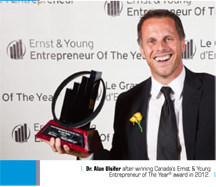By JoAnne Sommers
 In an industry well known for its conservatism, Dr. Alan Ulsifer is an anomaly. An innovator and a maverick, the founder and CEO of Calgary-based FYidoctors doesn’t mind stirring things up as he works to advance the interests of the more than 400 doctors who are part of the FYidoctors and Vision Source Canada platforms.
In an industry well known for its conservatism, Dr. Alan Ulsifer is an anomaly. An innovator and a maverick, the founder and CEO of Calgary-based FYidoctors doesn’t mind stirring things up as he works to advance the interests of the more than 400 doctors who are part of the FYidoctors and Vision Source Canada platforms.
Consider the company’s recently announced joint venture with VSP Vision Care Canada (VSP). The joint venture, which gives FYidoctors access to Canadian patients covered by VSP’s vision insurance program, combines the latter’s employee benefits platform with FYidoctors’ extensive network of independent optometrists across Canada, including its Vision Source Canada franchise locations.
VSP’s role is to market, sell and administer its vision care insurance platform to employers across Canada. In turn, employees of these organizations can seek care from FYidoctors’ network of optometrists as well as its Vision Source Canada franchise locations. FYidoctors will also, subject to strict criteria, allow access to independent eye doctors outside the core of FYidoctors’ companies.
While he is concerned about the false assumptions being circulated about the partnership, Ulsifer is unfazed by the controversy it has provoked. “Canadians don’t get their eyes examined often enough, in part because of the cost,” he says. “Using the VSP platform in this new company, we have created a program that is more accessible and will lead to more frequent eye exams and purchases of ophthalmic product.”
There is significant concern in the industry that VSP will be able unilaterally to dictate doctors’ fees for examinations and products as it can do in the U.S. This is not possible under the terms of the new Canadian company, says Ulsifer, who adds, “We believe the new company has fully addressed those fears and that it actually prevents a U.S.-type platform from being formed by VSP in Canada.”
Creating the best possible visual outcomes for its patients while striving to ensure that optometrists, not corporations, define what eyecare looks like in Canada, is the raison d’être of FYidoctors.
To that end, Ulsifer and his colleagues have created an infrastructure which he calls, “unique in the world. We’re corporate in name, not function. This is a doctor-owned and governed partnership of people with a commitment to providing the best possible eyecare technology, products and services. We understand that we need to be a certain size and scale to ensure a competitive advantage in the marketplace.”
The idea for FYidoctors emerged from Ulsifer’s visit to Vision Expo West in 2006. There, for the first time, he saw free-form lenses and the software that created them and recognized the opportunity to vertically integrate the optometric practice and create value. Fired up by the experience, he went home to Grande Prairie, AB and shared his vision with his partners at Northern Vision Centre, one of Canada’s largest independent optometric practices. They then invited 10 other practices to discuss market challenges and opportunities, and, as Ulsifer says, “everyone caught the bug.”
Later that year, Ulsifer led the largest corporate merger in Canadian history, based on the number of companies involved, with more than 80 professional corporations joining forces to create FYidoctors.
It took about two years to set up the new company’s infrastructure, he says. “We opened a lab in Burnaby, B.C., starting off with a 3,000-square-foot facility. Today we have more than 10 times that amount of space in a fully automated free-form laboratory and distribution facility, along with exclusive Canadian distribution of 15 products.”
The company now has more than 1,400 staff, including about 280 optometrists across 109 FYidoctors locations coast to coast. And last fall it acquired the Canadian assets and operations of Vision Source Canada, North America’s largest network of private practice optometrists, adding 105 Canadian Vision Source locations and approximately 150 optometrists to its roster.
Supporting them is a unique management team that features financial, marketing and legal specialists who have expertise beyond the optical industry.
The company’s structure and size and its unique support platforms have enabled FYidoctors to thrive in the face of the technological challenges the industry faces. As Ulsifer says, “Technology and economics don’t always align but through our shared efficiencies we make it work without having to pass all the costs on to our patients.”
The company’s critical mass has also enabled it to add attractive incentives such as its new Aeroplan partnership. FYidoctors recently acquired VEDI Corporation, which gives it the exclusive right to offer Aeroplan Miles at all of its corporate locations. There will be an opportunity for all Vision Source Canada franchise locations and other independent practices to offer Aeroplan Miles as well.
Ulsifer says the goal of FYidoctors is to stay ahead of the curve by anticipating emerging technological developments and business opportunities and adapting its platform to take advantage of them.
The company will introduce a new vision screening app in the coming weeks. It also plans to launch an Internet-based public portal designed to serve existing customers with branded frames, ophthalmic lenses and contact lenses. Thanks to new technology, licensed practitioners will be able to perform measurements via a virtual platform, thus enabling patients to choose the best possible products to meet their particular needs.
After taking a year off to implement a new practice management marketing program company-wide, FYidoctors recently embarked on an aggressive new growth phase, which began with the addition of the Vision Source franchises in October.
Going forward, the company is focused on ensuring that optometrists continue to play a significant role in shaping the eyecare field in Canada.
“We want to be involved in making the difficult decisions that will determine the future of optometrists and optometry in this country,” says Ulsifer. “Some of our choices are considered controversial because optometrists in this country have traditionally been more reactive than proactive. But we’re committed to determining our own destiny instead of sitting back and simply hoping for the best.”
While the Canadian optical market remains strong, Ulsifer predicts that it will experience considerable disruption in the short term. That, he says, will create fantastic opportunities for innovators who are willing to challenge the status quo.
“In 10 years, the delivery of eyecare in this country will look very different than it does today. Now that we enjoy a strategic advantage, we plan to leverage it to gain market share, promote all of our associated clinics and find new ways to deliver services that match changing consumer expectations.”








